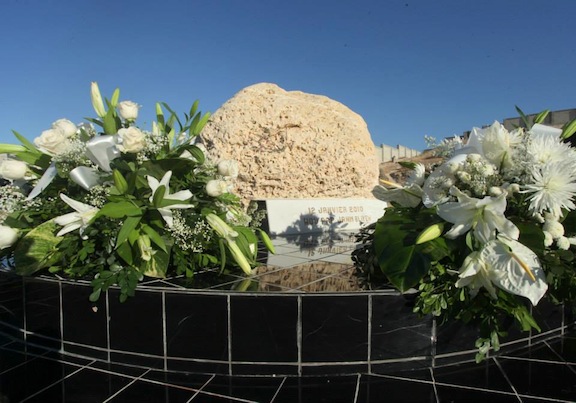Above: an earthquake memorial in Haiti (Photo: OP Haiti)
By Alexander Britell
On Sunday, Haiti marked the fourth anniversary of the devastating 2010 earthquake that devastated the country, with solemn memorial services and deep reflection.
Now, four years later, much has changed, as the country works both to rebuild and develop.
While much of what is being written about Haiti’s progress will focus on what remains wrong with Haiti, the reality is that Haiti is a country of dichotomies — and cannot be understood without looking at both the good and the bad.
Indeed, there are signs of progress across Haiti, just as there are reminders of Haiti’s longstanding challenges.
Months after the earthquake, more than 1.3 million people lived in makeshift tent camps, while today that number has dwindled to less than 200,000 — a reduction of about 90 percent. Of course, that hasn’t occurred without issues — some people have been removed through forced evictions, while others have found only temporary or inadequate housing solutions.
After economic growth slowed last year due in large part to crippling storms, it rebounded this year to at least 4 percent, according to a December estimate from the International Monetary Fund — good for the third-highest rate in the Caribbean region. Of course, unemployment is still seriously high, while questions remain over whether job-creating projects like the Caracol Industrial Park will bear fruit.
While security remains a concern (as in much of the Caribbean), the Haitian National Police has added more than 1,000 new officers, as part of a wider plan to increase the size of the force to 15,000 by 2016. It will need to keep doing that to fill the security vacuum that will be created by the inevitable departure of the United Nations peacekeeping force in Haiti.
Haiti has a major new hospital, the largest solar-powered hospital in the Caribbean. Of course, health remains one of Haiti’s biggest issues, from malnutrition to the continued problem of cholera.
Corruption still afflicts the government, and political gridlock between the Legislative and Executive branches, long the scourge of progress in Haiti, continues to hold back the country severely.
It’s been more than two years since Haiti was supposed to hold legislative and municipal elections, and it’s still unclear when those votes will happen, as international pressure continues to build.
And questions linger over the way billions in aid was distributed to the country in the years following the quake.
But, in large part, Haiti is not the same place it was on Jan. 12, 2010.
There is a fledgling tourism industry, with four new hotels, five airports under construction, two new seaports and a major tourism project planned on the island of Ile a Vache, progress Haiti Prime Minister Laurent Lamothe said was part of a much wider infrastructure-building programme.
“Haiti is doing enormous progress in an extremely difficult situation,” Haiti Prime Minister Laurent Lamothe told Caribbean Journal in an interview this weekend.
There are new roads, new bridges and new businesses, along with new air services from carriers like JetBlue and startup carriers like Sunrise Airways.
For Lamothe, the biggest successes in Haiti have been highlighted by the government’s free youth education programme, which he said had seen 1.4 million children go to school for free.
Another 133,000 adults were receiving education classes, while violent crime had fallen by 34 percent and kidnapping had dropped by 55 percent, he said.
“I think Haiti has tremendously improved in many different fields, whether it’s education, security, economy, social assistance, road construction and definitely the environment — Haiti’s cleaner today that it was before,” Lamothe said.
But the political gridlock has held back other initiatives, Lamothe said, from legislation aimed at improving Haiti’s business climate to its education law — legislation which has been voted on by one chamber of Parliament but not both. In all, there are 42 pieces of legislation stalled in Parliament, he said.
FOR YEARS, Haiti has long been fighting a battle on two fronts; its domestic issues and its perception abroad.
Much of the coverage of the country on the anniversary of the earthquake has focused on what observers see as a lack of progress, a charge Lamothe said was made using an unfair methodology.
“We have our work cut out for us,” he said. “But I think the media coverage focuses on one thing. And if that’s the one thing they focus on, they will see progress — they’re focusing on the people under the tents, where 90 percent have been relocated. So that is a sign of concrete progress and evidence of the country moving in the right direction.”
By next year, Lamothe said that he hoped to increase the number of children receiving free education waivers to 2.5 million and to maintain foreign investment, which has been a major stated priority of the administration of Haiti President Michel Martelly.
And he wanted one other thing: “We want the world to see Haiti as a success story.”
